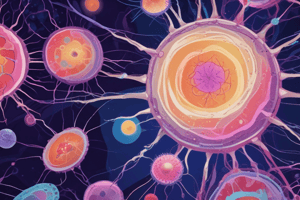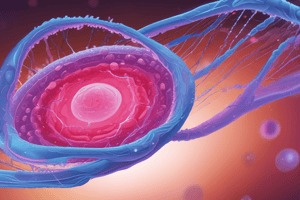Podcast
Questions and Answers
What is the primary factor that influences the ability of tissues to repair themselves?
What is the primary factor that influences the ability of tissues to repair themselves?
- The type of cells present
- The type of injury
- The amount of tissue mass
- The intrinsic proliferative capacity (correct)
Which cell type is capable of proliferating in response to injury or loss of tissue mass?
Which cell type is capable of proliferating in response to injury or loss of tissue mass?
- Stem cells
- Quiescent cells (correct)
- Nondividing cells
- Continuously dividing cells
What is the characteristic of stable tissues?
What is the characteristic of stable tissues?
- Minimal replicative activity (correct)
- Only nondividing cells
- No quiescent cells
- High replicative activity
Which of the following cells is an example of a stable cell?
Which of the following cells is an example of a stable cell?
What is the term for cells that are not actively dividing but can return to the cell cycle?
What is the term for cells that are not actively dividing but can return to the cell cycle?
What is the exception to tissues that have a limited capacity to regenerate after injury?
What is the exception to tissues that have a limited capacity to regenerate after injury?
Which of the following tissues is composed primarily of nondividing permanent cells?
Which of the following tissues is composed primarily of nondividing permanent cells?
What is the importance of quiescent cells in wound healing?
What is the importance of quiescent cells in wound healing?
What is the phase of the cell cycle that quiescent cells are in?
What is the phase of the cell cycle that quiescent cells are in?
What are the three cell types found in most mature tissues?
What are the three cell types found in most mature tissues?
Flashcards
Regenerative Medicine
Regenerative Medicine
The process of regenerating and repopulating damaged organs using stem cells, including therapeutic cloning.
Cell Proliferation
Cell Proliferation
The process of cells dividing and multiplying, triggered by chemical messengers.
Chemical Mediators
Chemical Mediators
Chemical messengers, like growth factors, hormones, and cytokines, that trigger cell growth and division.
Extracellular Matrix (ECM)
Extracellular Matrix (ECM)
Signup and view all the flashcards
Cell-Matrix Interactions
Cell-Matrix Interactions
Signup and view all the flashcards
Tissue Proliferative Capacity
Tissue Proliferative Capacity
Signup and view all the flashcards
Labile Tissues
Labile Tissues
Signup and view all the flashcards
Stable Tissues
Stable Tissues
Signup and view all the flashcards
Permanent Tissues
Permanent Tissues
Signup and view all the flashcards
Cell Cycle & Proliferation
Cell Cycle & Proliferation
Signup and view all the flashcards
Study Notes
Stem Cells and Regenerative Medicine
- Regenerative medicine aims to regenerate and repopulate damaged organs using ES or adult stem cells, including stem cell therapy known as therapeutic cloning.
Cell Proliferation
- Cell proliferation is triggered by chemical mediators such as growth factors, hormones, and cytokines.
- Growth factors produced by leukocytes, parenchymal cells, or stromal cells can contribute to tissue repair.
- A vast array of growth factors is involved in tissue repair, with examples including:
- Platelet-derived growth factor (PDGF)
- Fibroblast growth factor (FGF)
- Epidermal growth factor (EGF)
- Transforming growth factor-beta (TGF-β)
Extracellular Matrix (ECM) and Cell-Matrix Interactions
- Tissue repair depends on interactions between cells and ECM components.
- The ECM is a dynamic, constantly remodeling macromolecular complex that surrounds cells.
- Cell-ECM interactions play a crucial role in repair processes, including cell proliferation and ECM repair.
Cell Proliferation and Repair
- Tissue repair involves the proliferation of various cells, including remnants of injured tissue, vascular endothelial cells, and fibroblasts.
- The normal size of cell populations is determined by a balance of cell proliferation, cell death by apoptosis, and the emergence of new differentiated cells from stem cells.
Cell Cycle and Proliferation
- The cell cycle has multiple controls, both positive and negative, and is critical in growth regulation.
- The key processes in cell proliferation are DNA replication and mitosis.
Tissue Proliferative Capacity
- The ability of tissues to repair themselves is critically influenced by their intrinsic proliferative capacity.
- Tissues are divided into three groups based on their proliferative capacity: labile, stable, and permanent tissues.
- Stable tissues, such as liver, kidney, and pancreas, have cells that are quiescent but can proliferate in response to injury or tissue loss.
Studying That Suits You
Use AI to generate personalized quizzes and flashcards to suit your learning preferences.





